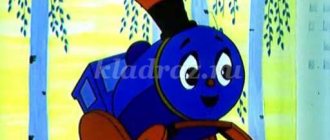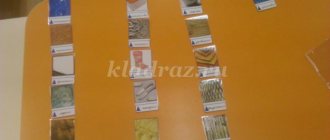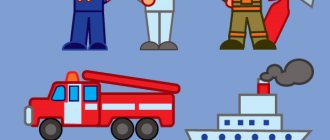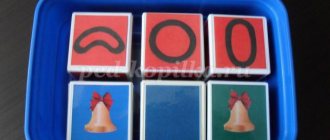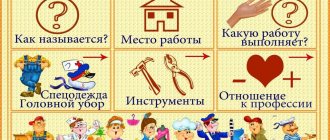Summary of GCD in the senior speech therapy group of preschool educational institution
Synopsis of the frontal speech therapy lesson “To help Snow White.”
Author: Netkacheva Elena Sergeevna, teacher of MBDOU “Combined Kindergarten No. 34 Kolokolchik”, Mozdok, North Ossetia-Alania. Description of the material: I offer you a summary of direct educational activities for children in the senior speech therapy group. This material will be useful to speech therapists and teachers of speech therapy groups. Summary of the direct educational activities of children in the senior speech therapy group “To help Snow White.” GCD tasks: - To consolidate children’s skills in dividing words into syllables, determining the location of sounds in a word. — Consolidate knowledge about the difference between vowels and consonants. — Improve the grammatical structure of speech, coordinate numerals with nouns. — Exercise the ability to perform sound analysis of words. — Develop fine and articulatory motor skills, breathing. — Develop attention and memory. - Cultivate responsiveness and friendliness. Equipment: Letter from Snow White, 7 keys, letters, pictures with illustrations, a card with a “ciphered word”, cards with unfinished letters, mirrors for each child.
Progress of GCD
Organizational moment: The one who says the first sound of his name will sit in his place. Speech therapist teacher: Guys, a letter arrived in our group today. I'll read it now.
“Guys, Snow White from the fairy tale “The Seven Dwarfs” is writing to you. I was kidnapped by the evil Queen and imprisoned in a stone castle. She closed the door with seven locks. The queen said that she will let you go if you complete all the tasks. There will be seven tasks. For each correctly completed task, a key is given. If by the end of the lesson you have seven keys, then you can free me. I really need your help." Speech therapist teacher: Guys, the tasks will be difficult. Do you think you can handle them? Before we start saving Snow White, we need to gain strength and do breathing and articulation exercises. Breathing gymnastics: Inhale through the nose - exhale through the mouth (5 - 6 times) Articulation gymnastics: Swing Painter Fungus Accordion Teacher-speech therapist: Well, are you ready, let's save Snow White? Children: Yes. Speech therapist teacher: Here is the first task. Task No. 1 The speech therapist shows the letters, the children name them. —What is the difference between a letter and a sound? (we see and write letters, and we speak and hear sounds.) - What sounds are there? (vowels and consonants) - How do vowels differ from consonants? (We can sing vowel sounds, the air stream passes freely. We cannot sing consonant sounds, the air stream meets an obstacle. Tongue, teeth and lips.) Well done, guys, you answered all the questions correctly, and the Queen gives you the first key. Task No. 2 Didactic exercise “Enchanted word”. Speech therapist teacher: Guys, the Queen enchanted one word. This is Snow White's favorite time of year. But in order for us to guess it, we will have to try. We need to determine the first sound in the words whose objects are depicted on the card, and then we will find out which word the Queen enchanted.
Tasks No. 3 Didactic game “Unfinished painting”. Read the word after inserting the missing letter. What letter did the artist miss? Well done, you have completed this task, and the Queen gives you another key. Task No. 4 Gymnastics for the eyes: Look to the right, left, up, down, blink. Finger gymnastics. There is a lock hanging on the door (we join our hands in a lock, intertwining our fingers)
Who could open it?
Twisted, (turn the lock without releasing the fingers)
Pulled,
(move our palms apart in different directions, fingers still clasped)
Knocked,
(palms clap each other, fingers remain in the lock)
And opened!
(we unclasp our fingers) Speech therapist teacher: here we have another key in our hands. Task No. 5 Didactic exercise “Gift to the Queen” Each child has a card with pictures. Child: “I will give the Queen five rings.” “I will give the Queen three baskets,” etc. Speech therapist teacher: The Queen has become kinder and gives you the key. Task No. 6 Name the object a word and say how many syllables are in this word. The speech therapist teacher shows children illustrations with pictures. Children divide words into syllables. Well done, you completed this task and receive the key. Task No. 7 Now complete the task “Letter-eating beetle” (the beetle ate part of the letter, you need to complete it). (Each child has an individual card; after everyone has completed the task, they compare it with the sample.)
Speech therapist teacher: The Queen gave us the last, seventh key! And now Snow White can be freed. A slide with a picture of Snow White appears on the screen. Snow White thanks all the children for their help. “And now it’s time for me to go to my fairy tale. See you later!!!!"
We recommend watching:
Summary of a lesson in the senior group of compensatory orientation for children with severe speech impairments
Summary of GCD in the senior group of children with severe speech impairments on the topic: “The sound of K” Summary of GCD in the senior group of children with severe speech impairments on the topic: “Sounds of K - K” Scenario of speech therapy leisure in the senior group “New Year's miracles”
Similar articles:
Abstract of NOD OO "Communication" in the senior group
Synopsis of NOD OO "Communication" in the senior group on the topic "Spring and signs of spring"
Integrated game session in a senior speech therapy group
Summary of speech therapy classes in the senior group
Abstract of GCD in the senior group on the topic: “White fluffy snow...”
Our school educates children with disabilities. The category of students with mental retardation is the most numerous among children with disabilities (CHD) and a heterogeneous group of schoolchildren.The success and effectiveness of correctional work directly depends on the speech therapy examination carried out at the beginning of training. I consider careful diagnostics to be of particular importance for successful speech therapy work.
Diagnostics is a speech examination that gives an idea of the state of the child’s speech development and allows us to determine the type of speech pathology, its form and severity of the speech defect.
The main tasks of diagnostics are:
- identification of deviations in the development of oral and written forms of speech;
- determination of the structure of a speech defect;
-formulation of speech diagnosis;
-drawing up a program of correctional work.
The relevance of this area of work lies in the following. That the corrective intervention program, and ultimately the effectiveness of speech therapy work with children, depends on timely, qualified diagnostics.
In my work, when examining speech, I use the methods of T.A. Fotekova: test methodology for diagnosing oral speech of primary schoolchildren. During the examination I also use the methods of T.V. Akhutina, O.B. Inshakova. I am using an album for a speech therapist, author Inshakova O.B.
The technique is of a test nature, the procedure for its implementation and the assessment system are standardized, which makes it possible to visually present the picture of a speech defect and determine the severity of the violation of different aspects of speech, and is also convenient for tracking the dynamics of the child’s speech development and the effectiveness of correctional interventions.
The methodology consists of two sections.
The first is aimed at studying the characteristics of oral speech, the second - at testing written speech. The first section includes 2 blocks that allow you to determine the level of development of expressive and impressive speech. Each block, in turn, is divided into series, and the series into groups of tasks that combine specific speech tests.
The second section of the methodology is aimed at testing written speech. It consists of three series, which are presented in slightly different versions for first-graders and students in grades 2-3. Episode 1 examines the background to writing, Episode 2 focuses on assessing writing, and Episode 3 tests reading skills.
For each series and each group of tasks, its own scoring system has been developed, taking into account the nature, severity and number of errors made.
During the initial processing, the points for each sample, group of tasks, series, blocks and method as a whole are summed up. The percentage expression for the quality of implementation of the technique obtained as a result of calculations can be correlated with one of four levels of success:
Level IV - 100-80%;
Level III - 79.9-65%;
Level II - 64.9-50%;
Level I - 49.9% and below.
Based on the results of processing the examination protocols, it is convenient to draw an individual speech profile for each child. It clearly shows which components of the speech system suffer to a greater extent and which are relatively intact. A comparison of speech profiles obtained during the initial and repeated examinations clearly shows the dynamics of speech development and indicates the degree of effectiveness of the correctional work carried out with the child.
It is necessary to have a manual, because the protocol does not contain criteria and gradations for assessing assignments of all series. Computer skills and ability to use EXCEL.
“I offer educational and diagnostic materials from my work experience , which can be useful to speech therapists and speech pathologists, primary school teachers for speech therapy diagnostics of students”
MATERIALS FOR SPEECH PEDIC EXAMINATION according to the method of T.V. Akhutina, T.A. Photocopy abbreviated version):
Series 1. Study of the sensorimotor level of speech
Series 2. Study of the grammatical structure of speech
Series 3. Study of vocabulary and word formation skills
Series 4. Study of coherent speech
Methodology for processing results
